人教版(2019)选择性必修第三册Unit 5 Poems Using Language 课件(共18张PPT)
文档属性
| 名称 | 人教版(2019)选择性必修第三册Unit 5 Poems Using Language 课件(共18张PPT) | 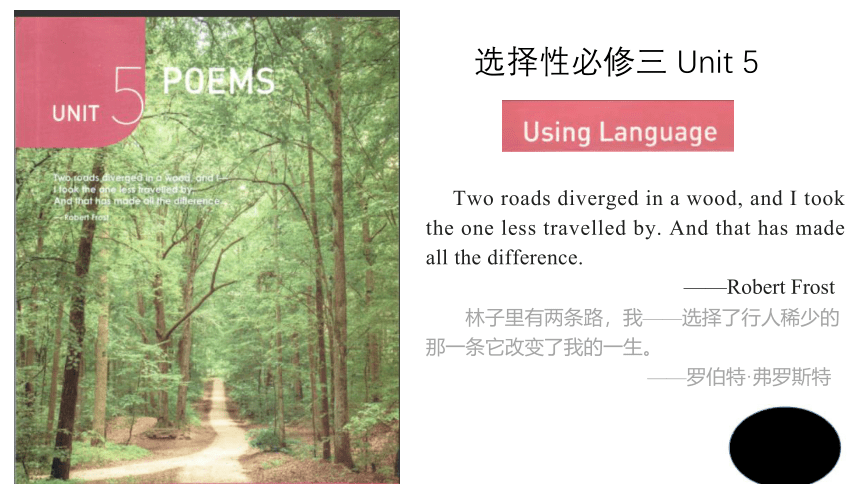 | |
| 格式 | pptx | ||
| 文件大小 | 9.7MB | ||
| 资源类型 | 教案 | ||
| 版本资源 | 人教版(2019) | ||
| 科目 | 英语 | ||
| 更新时间 | 2024-04-14 12:36:43 | ||
图片预览

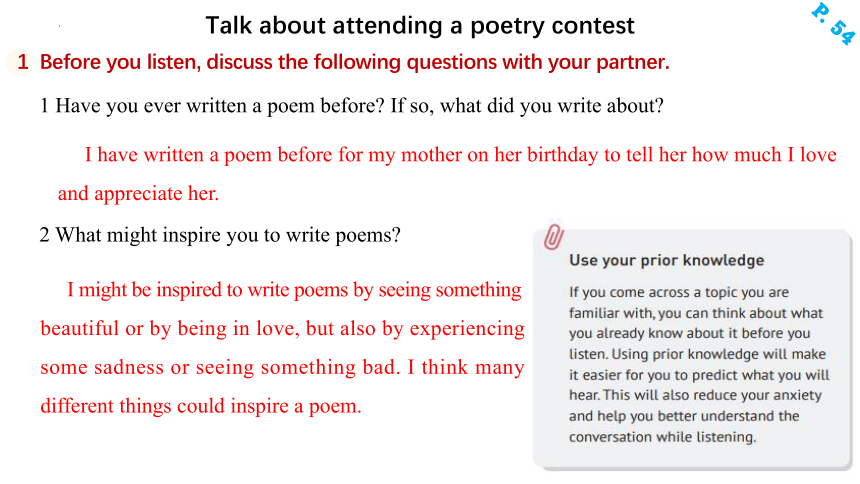
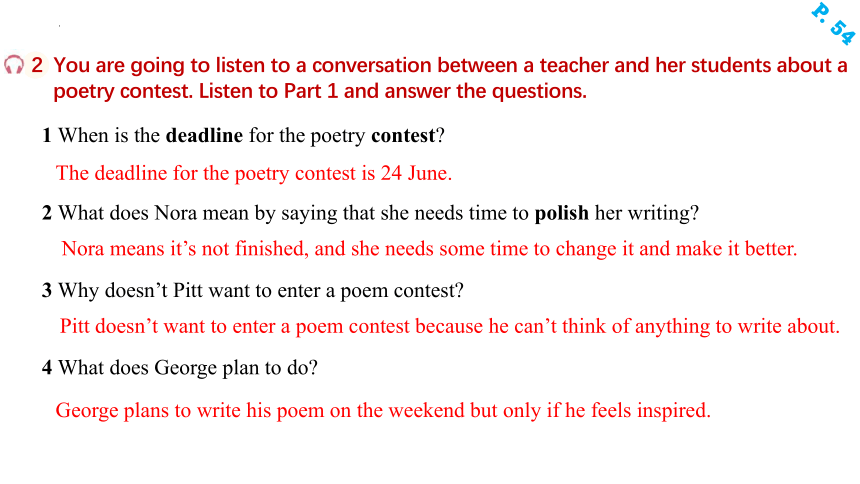
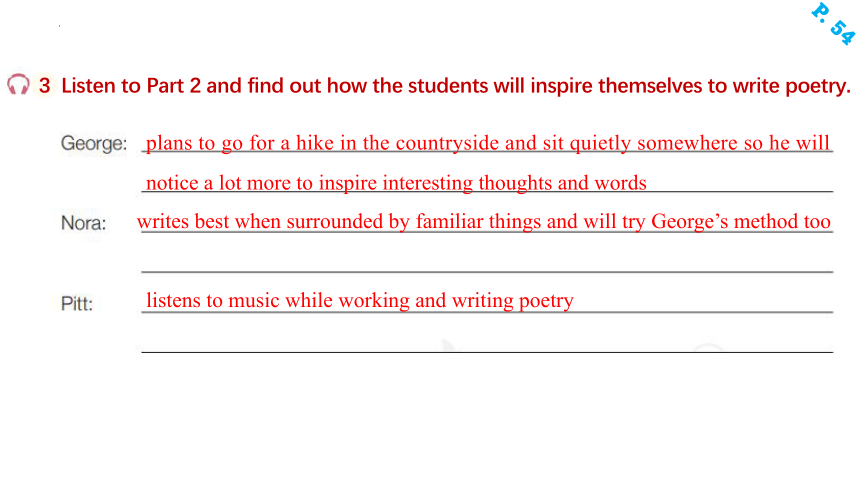
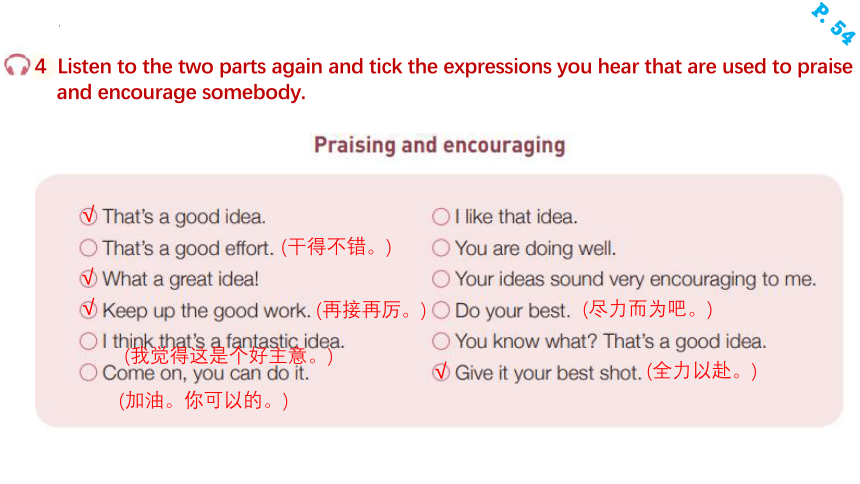
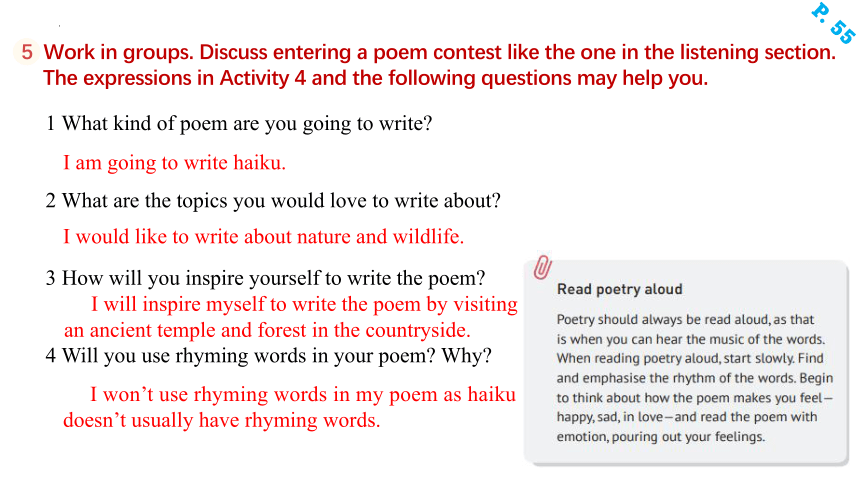
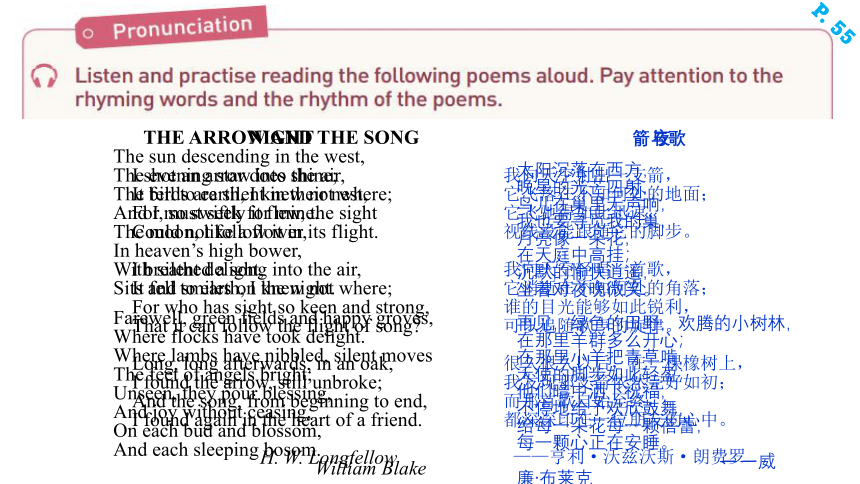
文档简介
(共18张PPT)
选择性必修三 Unit 5
Two roads diverged in a wood, and I took
the one less travelled by. And that has made
all the difference.
——Robert Frost
林子里有两条路,我——选择了行人稀少的那一条它改变了我的一生。
——罗伯特·弗罗斯特
P. 54
Talk about attending a poetry contest
1 Before you listen, discuss the following questions with your partner.
1 Have you ever written a poem before If so, what did you write about
2 What might inspire you to write poems
I might be inspired to write poems by seeing something
beautiful or by being in love, but also by experiencing
some sadness or seeing something bad. I think many
different things could inspire a poem.
I have written a poem before for my mother on her birthday to tell her how much I love
and appreciate her.
P. 54
2 You are going to listen to a conversation between a teacher and her students about a
poetry contest. Listen to Part 1 and answer the questions.
1 When is the deadline for the poetry contest
2 What does Nora mean by saying that she needs time to polish her writing
3 Why doesn’t Pitt want to enter a poem contest
4 What does George plan to do
George plans to write his poem on the weekend but only if he feels inspired.
The deadline for the poetry contest is 24 June.
Nora means it’s not finished, and she needs some time to change it and make it better.
Pitt doesn’t want to enter a poem contest because he can’t think of anything to write about.
P. 54
3 Listen to Part 2 and find out how the students will inspire themselves to write poetry.
plans to go for a hike in the countryside and sit quietly somewhere so he will
notice a lot more to inspire interesting thoughts and words
writes best when surrounded by familiar things and will try George’s method too
listens to music while working and writing poetry
P. 54
4 Listen to the two parts again and tick the expressions you hear that are used to praise
and encourage somebody.
√
√
√
√
(再接再厉。)
(全力以赴。)
(干得不错。)
(我觉得这是个好主意。)
(加油。你可以的。)
(尽力而为吧。)
5 Work in groups. Discuss entering a poem contest like the one in the listening section.
The expressions in Activity 4 and the following questions may help you.
1 What kind of poem are you going to write
2 What are the topics you would love to write about
3 How will you inspire yourself to write the poem
4 Will you use rhyming words in your poem Why
P. 55
I won’t use rhyming words in my poem as haiku
doesn’t usually have rhyming words.
I am going to write haiku.
I would like to write about nature and wildlife.
I will inspire myself to write the poem by visiting
an ancient temple and forest in the countryside.
P. 55
THE ARROW AND THE SONG
I shot an arrow into the air,
It fell to earth, I knew not where;
For, so swiftly it flew, the sight
Could not follow it in its flight.
I breathed a song into the air,
It fell to earth, I knew not where;
For who has sight so keen and strong,
That it can follow the flight of song
Long, long afterwards, in an oak,
I found the arrow, still unbroke;
And the song, from beginning to end,
I found again in the heart of a friend.
H. W. Longfellow
箭与歌
我向天空射出一支箭,
它飞落在不知何处的地面;
它飞驰得如此迅速,
视线没能跟随它的脚步。
我向天空轻唱一首歌,
它消逝在不知何处的角落;
谁的目光能够如此锐利,
可以追随歌声的旋律。
很久很久以后,在一棵橡树上,
我发现那支箭依然完好如初;
而那首歌自始至终,
都深深印在一位朋友的心中。
——亨利·沃兹沃斯·朗费罗
NIGHT
The sun descending in the west,
The evening star does shine;
The birds are silent in their nest,
And I must seek for mine.
The moon, like a flower,
In heaven’s high bower,
With silent delight,
Sits and smiles on the night.
Farewell, green fields and happy groves,
Where flocks have took delight.
Where lambs have nibbled, silent moves
The feet of angels bright;
Unseen, they pour blessing,
And joy without ceasing,
On each bud and blossom,
And each sleeping bosom.
William Blake
夜
太阳沉落在西方,
晚星的光芒四射,
鸟儿在巢里无声响,
我也要寻觅我的巢,
月亮像一朵花,
在天庭中高挂;
沉默的愉快逍遥,
坐着对夜晚微笑。
再见,绿色的田野,欢腾的小树林,
在那里羊群多么开心;
在那里小羊把青草啃,
天使的脚步如此轻盈;
他们暗中洒下祝福,
不停地给予欢欣鼓舞,
给每一朵花每一颗蓓蕾,
每一颗心正在安睡。
——威廉·布莱克
Write a poem
1 Before you read, discuss how to understand a poem with your partner. Make a list of
questions that the readers should consider while reading poems. The following points
may help you.
P. 56
2 Read the poems below and then complete the table.
P. 56
山上的风
没有人能够告诉我,
也没有人会知道,
风来自哪里,
又将去往哪里。
它从一个地方吹来
尽它所能,飞快地吹来,
我跟不上它,
即使我奔跑。
但如果不再紧握
我手中的风筝线,
它将随风飘走
一天一夜。
后来当我找到它时,
无论它飘到哪儿,
我会知道风
也曾经去过那里。
所以那时我能告诉人们,
风去了哪里……
但是风从哪里来
没有人知道。
——艾伦·亚历山大·米尔恩
P. 56
梦想
紧紧抓住梦想,
梦想若是消亡
生命就像鸟儿折了翅膀
再也不能飞翔。
紧紧抓住梦想,
梦想若是消亡
生命就像贫瘠的荒野
雪覆冰封,万物不再生长。
兰斯顿·休斯
配偶
爱情若是玫瑰,
我便是绿叶,
花和叶同生同长
沐阳光或披风霜,
在花坞或田野里,
共担忧伤共喜悦;
爱情若是玫瑰,
我便是绿叶。
阿尔加侬·查尔斯·斯温伯恩
P. 56
the wind
kite, person
knows / goes can / ran
kite / night blew / too
goes / knows
repetition
alliteration (头韵)
头韵:We went whale watching.
dreams
broken-winged bird,
barren field frozen
with snow
die / fly go / snow
repetition metaphor(暗喻)
love
rose, leaf, fields
together / weather
closes / is grief / leaf
repetition, metaphor,
simile
暗喻:Life is a broken-winged bird. Life is a barren field.
If love were what the rose is, and I were the leaf.
P. 57
3 Choose one of the poems and write a short essay about it. The following example may
help you.
P. 57
4 Write your own poem by following these steps.
Start with the theme first. Ask yourself, “What message do I want to give to the reader
What is important to me ”
Next, think about the words and phrases you would like to use. Make a list of words related
to your theme.
Then check how well your details paint a picture in your head. Now write the poem. Read it
aloud and listen to how it sounds.
Finally, give it a title. Now your poem is ready!
Language study
Write a poem
1 Before you read, discuss how to understand a poem with your partner. Make a list of
questions that the readers should consider while reading poems. The following points
may help you.
P. 56
______
image C (人或物留下的)印象、形象;画像、塑像、雕像;镜像、影像;(诗歌的)意象
e. g. His public image is very different from the real person. (C 形象)
A celebrity’s image is very important. (U 形象)
The images in the book are vivid. (画像、雕像)
He stared at his own image reflected in the water. (影像)
Poetic images are often beautiful. (意象)
Write a poem
1 Before you read, discuss how to understand a poem with your partner. Make a list of
questions that the readers should consider while reading poems. The following points
may help you.
P. 56
____
tone C (说话的)口气、腔调、口吻、声调;(乐器等的)音色、音质;(颜色的)色调、明暗
S (作品等的)格调、风格、基调、语气;(某场所或事件的)氛围
e. g. There is a falling tone on the first syllable and a rising tone on the other. (声调)
Don’t speak to me in that tone of voice. (口吻、口气)
The tone of the letter was very friendly. (语气)
Each brick varies lightly in tone, texture(质地) and size. (色调)
The tone of the report was radical. (基调)
Write a poem
1 Before you read, discuss how to understand a poem with your partner. Make a list of
questions that the readers should consider while reading poems. The following points
may help you.
P. 56
___________________
feelings P (精神上的)情感、(肉体上的)感受
emotion C & U (体验到的)强烈情感、激情;情绪
e. g. It won’t hurt my feelings if you change your mind. (感情)
Children slowly develop the ability to put their feelings into words. (情感)
A good speaker’s voice is usually full of emotion. (U 激情)
Joy is an emotion when we experience something exciting and positive while sadness is an
emotion when we experience a loss. (情绪)
Write a poem
1 Before you read, discuss how to understand a poem with your partner. Make a list of
questions that the readers should consider while reading poems. The following points
may help you.
P. 56
_______________
rhetorical devices 修辞手法
Assonance U 半谐音(相邻的两个词的元音或辅音相同):The cat is out of the bag.
Alliteration C & U 头韵(相连的单词的开头用的同样的字母或音素):wild and woolly
Hyperbole C & U 夸张:mile-high ice-cream cones (一英里高的冰激淋蛋糕)
Metaphor C & U 隐喻、暗喻:drowning in money
Simile C & U 明喻:cheeks like roses
Synecdoche C & U 提喻(部分指代整体或整体替代部分):We need more hands. (people)
选择性必修三 Unit 5
Two roads diverged in a wood, and I took
the one less travelled by. And that has made
all the difference.
——Robert Frost
林子里有两条路,我——选择了行人稀少的那一条它改变了我的一生。
——罗伯特·弗罗斯特
P. 54
Talk about attending a poetry contest
1 Before you listen, discuss the following questions with your partner.
1 Have you ever written a poem before If so, what did you write about
2 What might inspire you to write poems
I might be inspired to write poems by seeing something
beautiful or by being in love, but also by experiencing
some sadness or seeing something bad. I think many
different things could inspire a poem.
I have written a poem before for my mother on her birthday to tell her how much I love
and appreciate her.
P. 54
2 You are going to listen to a conversation between a teacher and her students about a
poetry contest. Listen to Part 1 and answer the questions.
1 When is the deadline for the poetry contest
2 What does Nora mean by saying that she needs time to polish her writing
3 Why doesn’t Pitt want to enter a poem contest
4 What does George plan to do
George plans to write his poem on the weekend but only if he feels inspired.
The deadline for the poetry contest is 24 June.
Nora means it’s not finished, and she needs some time to change it and make it better.
Pitt doesn’t want to enter a poem contest because he can’t think of anything to write about.
P. 54
3 Listen to Part 2 and find out how the students will inspire themselves to write poetry.
plans to go for a hike in the countryside and sit quietly somewhere so he will
notice a lot more to inspire interesting thoughts and words
writes best when surrounded by familiar things and will try George’s method too
listens to music while working and writing poetry
P. 54
4 Listen to the two parts again and tick the expressions you hear that are used to praise
and encourage somebody.
√
√
√
√
(再接再厉。)
(全力以赴。)
(干得不错。)
(我觉得这是个好主意。)
(加油。你可以的。)
(尽力而为吧。)
5 Work in groups. Discuss entering a poem contest like the one in the listening section.
The expressions in Activity 4 and the following questions may help you.
1 What kind of poem are you going to write
2 What are the topics you would love to write about
3 How will you inspire yourself to write the poem
4 Will you use rhyming words in your poem Why
P. 55
I won’t use rhyming words in my poem as haiku
doesn’t usually have rhyming words.
I am going to write haiku.
I would like to write about nature and wildlife.
I will inspire myself to write the poem by visiting
an ancient temple and forest in the countryside.
P. 55
THE ARROW AND THE SONG
I shot an arrow into the air,
It fell to earth, I knew not where;
For, so swiftly it flew, the sight
Could not follow it in its flight.
I breathed a song into the air,
It fell to earth, I knew not where;
For who has sight so keen and strong,
That it can follow the flight of song
Long, long afterwards, in an oak,
I found the arrow, still unbroke;
And the song, from beginning to end,
I found again in the heart of a friend.
H. W. Longfellow
箭与歌
我向天空射出一支箭,
它飞落在不知何处的地面;
它飞驰得如此迅速,
视线没能跟随它的脚步。
我向天空轻唱一首歌,
它消逝在不知何处的角落;
谁的目光能够如此锐利,
可以追随歌声的旋律。
很久很久以后,在一棵橡树上,
我发现那支箭依然完好如初;
而那首歌自始至终,
都深深印在一位朋友的心中。
——亨利·沃兹沃斯·朗费罗
NIGHT
The sun descending in the west,
The evening star does shine;
The birds are silent in their nest,
And I must seek for mine.
The moon, like a flower,
In heaven’s high bower,
With silent delight,
Sits and smiles on the night.
Farewell, green fields and happy groves,
Where flocks have took delight.
Where lambs have nibbled, silent moves
The feet of angels bright;
Unseen, they pour blessing,
And joy without ceasing,
On each bud and blossom,
And each sleeping bosom.
William Blake
夜
太阳沉落在西方,
晚星的光芒四射,
鸟儿在巢里无声响,
我也要寻觅我的巢,
月亮像一朵花,
在天庭中高挂;
沉默的愉快逍遥,
坐着对夜晚微笑。
再见,绿色的田野,欢腾的小树林,
在那里羊群多么开心;
在那里小羊把青草啃,
天使的脚步如此轻盈;
他们暗中洒下祝福,
不停地给予欢欣鼓舞,
给每一朵花每一颗蓓蕾,
每一颗心正在安睡。
——威廉·布莱克
Write a poem
1 Before you read, discuss how to understand a poem with your partner. Make a list of
questions that the readers should consider while reading poems. The following points
may help you.
P. 56
2 Read the poems below and then complete the table.
P. 56
山上的风
没有人能够告诉我,
也没有人会知道,
风来自哪里,
又将去往哪里。
它从一个地方吹来
尽它所能,飞快地吹来,
我跟不上它,
即使我奔跑。
但如果不再紧握
我手中的风筝线,
它将随风飘走
一天一夜。
后来当我找到它时,
无论它飘到哪儿,
我会知道风
也曾经去过那里。
所以那时我能告诉人们,
风去了哪里……
但是风从哪里来
没有人知道。
——艾伦·亚历山大·米尔恩
P. 56
梦想
紧紧抓住梦想,
梦想若是消亡
生命就像鸟儿折了翅膀
再也不能飞翔。
紧紧抓住梦想,
梦想若是消亡
生命就像贫瘠的荒野
雪覆冰封,万物不再生长。
兰斯顿·休斯
配偶
爱情若是玫瑰,
我便是绿叶,
花和叶同生同长
沐阳光或披风霜,
在花坞或田野里,
共担忧伤共喜悦;
爱情若是玫瑰,
我便是绿叶。
阿尔加侬·查尔斯·斯温伯恩
P. 56
the wind
kite, person
knows / goes can / ran
kite / night blew / too
goes / knows
repetition
alliteration (头韵)
头韵:We went whale watching.
dreams
broken-winged bird,
barren field frozen
with snow
die / fly go / snow
repetition metaphor(暗喻)
love
rose, leaf, fields
together / weather
closes / is grief / leaf
repetition, metaphor,
simile
暗喻:Life is a broken-winged bird. Life is a barren field.
If love were what the rose is, and I were the leaf.
P. 57
3 Choose one of the poems and write a short essay about it. The following example may
help you.
P. 57
4 Write your own poem by following these steps.
Start with the theme first. Ask yourself, “What message do I want to give to the reader
What is important to me ”
Next, think about the words and phrases you would like to use. Make a list of words related
to your theme.
Then check how well your details paint a picture in your head. Now write the poem. Read it
aloud and listen to how it sounds.
Finally, give it a title. Now your poem is ready!
Language study
Write a poem
1 Before you read, discuss how to understand a poem with your partner. Make a list of
questions that the readers should consider while reading poems. The following points
may help you.
P. 56
______
image C (人或物留下的)印象、形象;画像、塑像、雕像;镜像、影像;(诗歌的)意象
e. g. His public image is very different from the real person. (C 形象)
A celebrity’s image is very important. (U 形象)
The images in the book are vivid. (画像、雕像)
He stared at his own image reflected in the water. (影像)
Poetic images are often beautiful. (意象)
Write a poem
1 Before you read, discuss how to understand a poem with your partner. Make a list of
questions that the readers should consider while reading poems. The following points
may help you.
P. 56
____
tone C (说话的)口气、腔调、口吻、声调;(乐器等的)音色、音质;(颜色的)色调、明暗
S (作品等的)格调、风格、基调、语气;(某场所或事件的)氛围
e. g. There is a falling tone on the first syllable and a rising tone on the other. (声调)
Don’t speak to me in that tone of voice. (口吻、口气)
The tone of the letter was very friendly. (语气)
Each brick varies lightly in tone, texture(质地) and size. (色调)
The tone of the report was radical. (基调)
Write a poem
1 Before you read, discuss how to understand a poem with your partner. Make a list of
questions that the readers should consider while reading poems. The following points
may help you.
P. 56
___________________
feelings P (精神上的)情感、(肉体上的)感受
emotion C & U (体验到的)强烈情感、激情;情绪
e. g. It won’t hurt my feelings if you change your mind. (感情)
Children slowly develop the ability to put their feelings into words. (情感)
A good speaker’s voice is usually full of emotion. (U 激情)
Joy is an emotion when we experience something exciting and positive while sadness is an
emotion when we experience a loss. (情绪)
Write a poem
1 Before you read, discuss how to understand a poem with your partner. Make a list of
questions that the readers should consider while reading poems. The following points
may help you.
P. 56
_______________
rhetorical devices 修辞手法
Assonance U 半谐音(相邻的两个词的元音或辅音相同):The cat is out of the bag.
Alliteration C & U 头韵(相连的单词的开头用的同样的字母或音素):wild and woolly
Hyperbole C & U 夸张:mile-high ice-cream cones (一英里高的冰激淋蛋糕)
Metaphor C & U 隐喻、暗喻:drowning in money
Simile C & U 明喻:cheeks like roses
Synecdoche C & U 提喻(部分指代整体或整体替代部分):We need more hands. (people)
